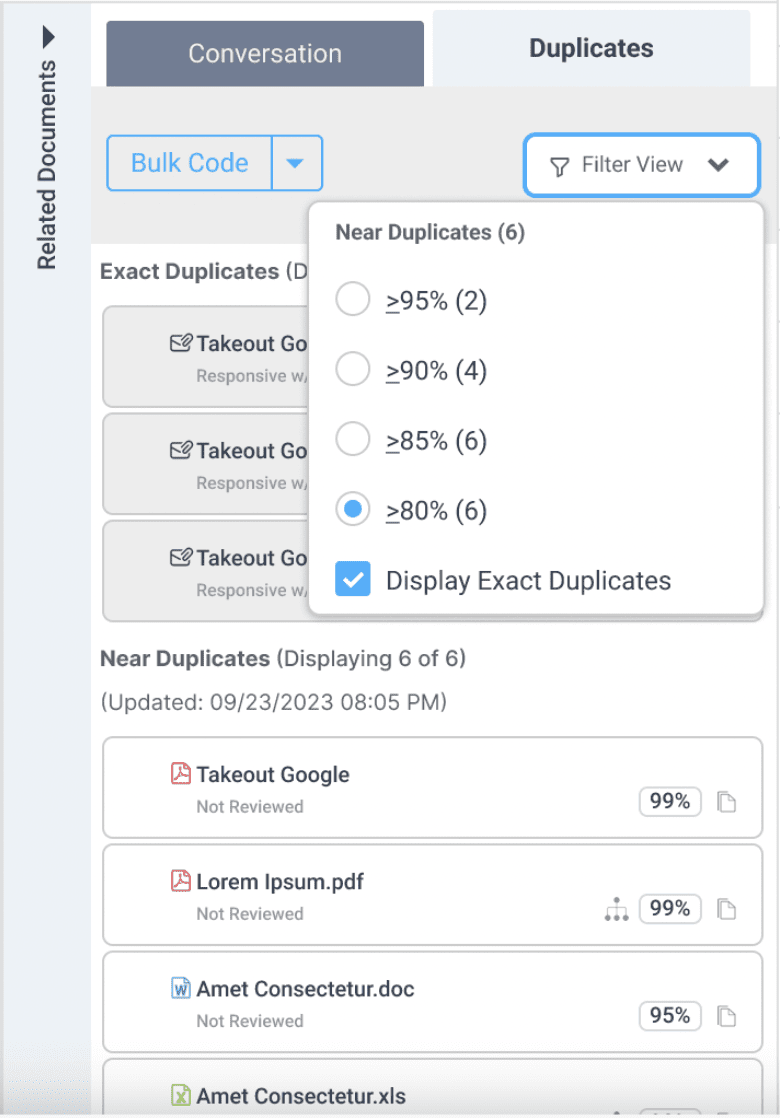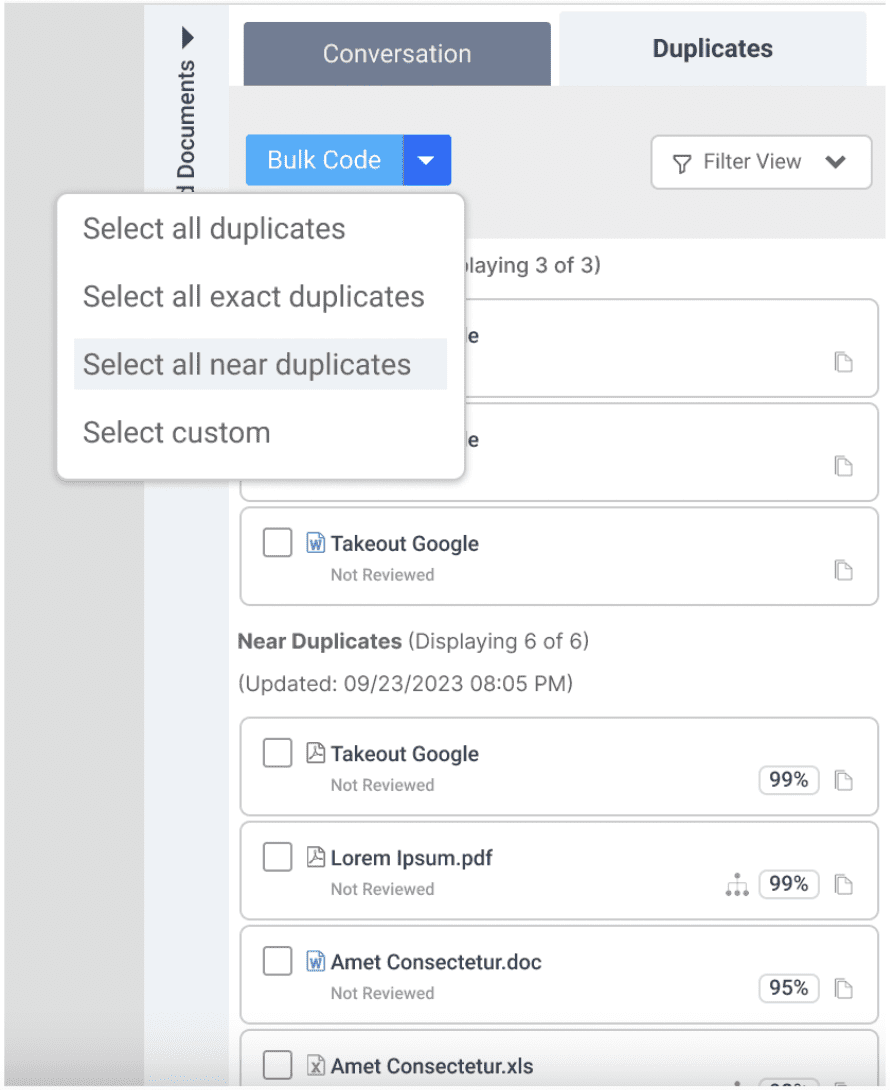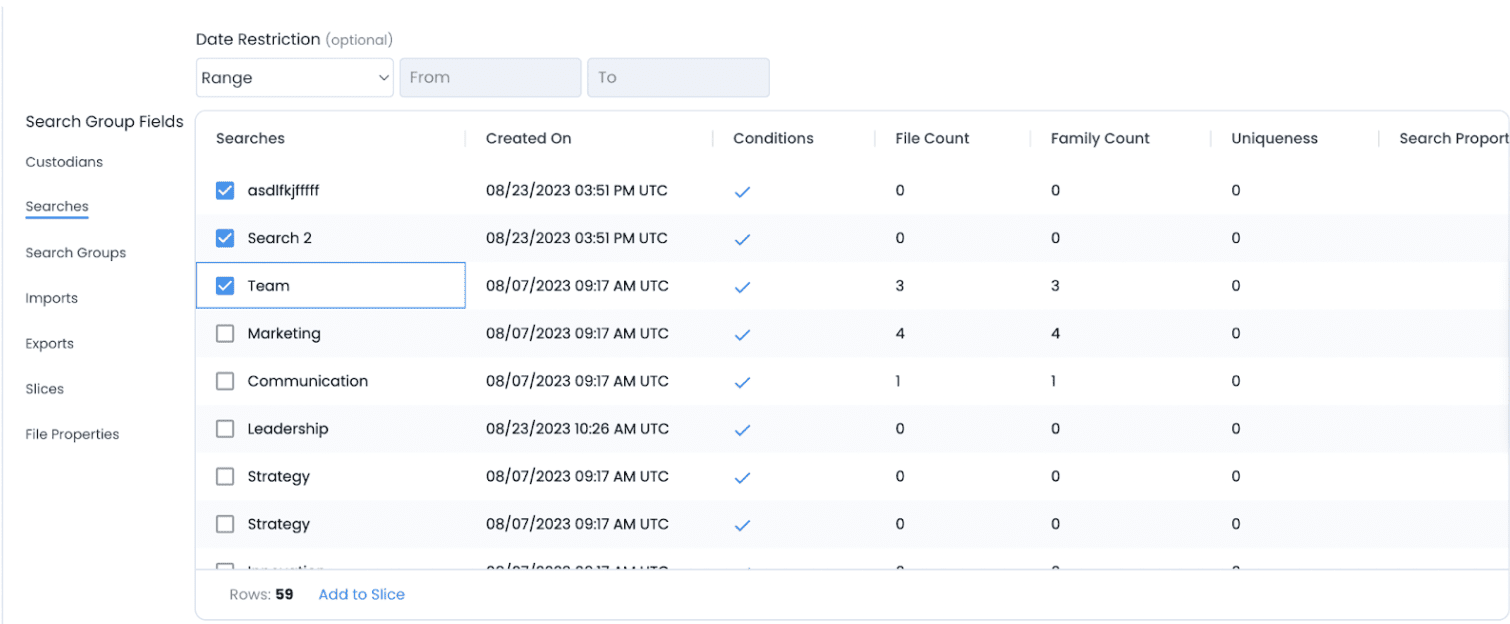The evolution continues. Here are the latest enhancements to your ediscovery and case management software.
Legal data has increased in both volume and complexity, calling for a new generation of technology that intuits and adapts to the intricacies of our modern digital world. The new AI tools in Nextpoint offer a solution that streamlines the litigation process without sacrificing the quality of discovery and case prep.
Automated Analysis of Your Documents
A typical ediscovery caseload can include tens of thousands of documents – and sifting through each file one by one requires extensive time and resources. But skirting by document review can lead to critical consequences, like missing key pieces of information or inadvertently waiving privilege. Legal teams need automated solutions that mitigate the risk of discovery mistakes – you should never have to sacrifice accuracy for efficiency.
Within a huge set of ediscovery data, many documents will be virtually the same, with minor differences. Ever had deja-vu from reviewing the same document for the fourth time, only to realize it was sent over and over in a massive email thread? Those documents are known as “near-duplicates.” It’s like a new edition of a book, but all that’s changed is the foreword.
Now, Nextpoint software can identify and group near-duplicates together so that users can analyze and code them in one sweep, without wasting time reviewing repeat documents. Each duplicate includes a similarity score indicating how similar it is to the original document, which enables users to make informed coding decisions. It’s automated and efficient, but the power still lies in the irreplaceable judgment of the reviewer.
Our skilled team of developers engineered a complex machine learning algorithm designed to maximize accuracy and speed while minimizing costs. Nextpoint Law Group is here to help users understand the nuances of this technology and implement custom solutions to ensure near-duplicate analysis meets the intricate needs of every case.
Utilizing near-duplicate analysis
| Contract Analysis | Evaluate progressive versions |
| Nonstandard ESI | Evaluate Hard copy files or other files without metadata |
| Disorganized Document Collections | The same documents provided multiple times in varying formats |
| Analyze Email Attachments | Compare similar documents attached to varying correspondence |
| Hot Docs | Identify documents similar to the key evidence in your matter |
| Validate Coding Consistency | Double check similar documents that are coded differently |
| Privilege Protection | Easily review documents similar to those marked “privileged” |
| Document Productions | Track and compare the same documents produced by different parties |
| Deposition Prep | Compare which preceding depositions utilized similar document evidence |
| Multidistrict Litigation | Track similar documents produced and/or utilized in a deposition across cases |
Intelligent Search Tools: Go Beyond the Keyword Query
In most litigation today, users have to sift through a mountain of potential evidence to find the relevant documents, and the first method in their toolkit is a simple keyword search. But a keyword search won’t work on all the evidence a litigator might see in 2023.
That’s why we added advanced Machine Learning features to Data Mining – to make the unsearchable, searchable. Users receive deeper insights into their data and can easily comb through images, audio files, foreign language text, and handwritten documents, alongside the rest of their data.
Here are the four new types of Machine Learning analysis users can take advantage of in Data Mining:
- Image Recognition: Images will appear in search results based on the contents of the image. Our complex analysis means that an image of a bridge could show up in searches like “bridge,” “construction,” “construction site,” “infrastructure,” etc.
- Handwriting Recognition: This feature will detect, read, and extract handwritten text so that it can show up in search queries. While most legal data today is produced electronically, plenty of litigation involves meeting notes, calendars, and other handwritten documents. You don’t want to lose those relevant analog materials in a sea of ESI.
- Transcription: Video and audio files will be transcribed, allowing the contents to appear in searches. For example, you could search the word “profit” and find emails discussing profits as well as a recording of a Zoom meeting where profits were mentioned.
- Translation: Foreign language documents will be translated to English, which means you don’t have to run searches in multiple languages. Simply search a term like “contract” and see all the matches in English, Spanish, German, or any other language populating your database.
These features eliminate time-consuming manual processes while ensuring you have the tools to find your smoking gun, no matter what form it takes.
Slice Up Your Data Seamlessly
It’s not enough for all your data to be searchable – in order to find that needle in a haystack, you need robust search tools that enable you to filter and organize your data with ease.
In Data Mining’s new Slice Builder, users can stack various criteria to build complex searches in just a few clicks. By combining factors like search terms, custodians, imports, and file types and properties, you get more than just search results – it’s a “slice” of your data that you can save, share, and analyze using Data Mining’s visual reporting features.
Paired with advanced Machine Learning analytics, the comprehensive Slice Builder offers endless ways to organize, understand, and interpret your data.
See Nextpoint AI in Action
Talk of AI chatbots and image generators has flooded the internet – and the legal tech world. But these GenAI tools have a long way to go before they can be a strong asset for legal teams. Nextpoint’s AI technology utilizes trusted algorithms that have been developed and tested specifically for legal cases, complete with comprehensive security measures and quality controls. With our AI tools, you’ll see tangible solutions to the challenges you’re facing today.
Reach out to your client success director to take advantage of near-duplicate analysis, Data Mining machine learning, and more advanced Nextpoint features. Or, schedule a chat with Nextpoint Law Group to consult with our legal data specialists about the unique needs of your case.
Questions? Feedback? Please contact our team at support@nextpoint.com.







